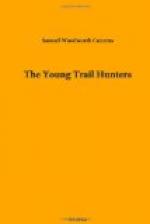When I asked him what he saw that indicated the course of the trail, he showed me that the surface of the rock was covered with a very fine, dry moss, that, with the closest scrutiny, bore evidence of having been pressed by the foot: so slight was the impression made, it would have escaped the notice of ninety-nine out of every hundred persons; yet his keen eyes detected every footprint as plainly as though it had been made in the grass.
If a trail is for any reason lost, an expert will easily recover it by following for a time its general direction and watching the formation of the land; for all trails are made over the highest portions, thereby affording a view of the entire country through which they pass.
In the grass, a trail can be seen for a long time: the blades will be trodden down and bent in the direction followed by the party; and, even after it has recovered its natural position, a good trailer will have no difficulty in following it; for his keen eye will detect a slight difference in the color of the grass that has been stepped on from that growing around it.
So, also, the appearance of the tracks will at once show him the gait at which the party were travelling, and he thus knows how to regulate his pace so as to overtake them.
It is exceedingly rare to find a white person that can retrace his steps for any distance in an open country; while an Indian is always able to do it. No matter how circuitous may be the route by which you may have reached a certain locality, an Indian will find his way back to the place of starting by the most direct route, though it be in the darkest night; and, if you ask him how he does it, if he replies to your question at all, he will simply shrug his shoulders and say, “Quien sabe?” or who knows.
No matter how agreeable he may be about camp; on the road he never speaks, except it should be necessary to give some direction or order.
Thus it will be seen, that he who would become a skilful trailer, must of necessity be an observer, as well as thinker; and remember, boys, that he who talks most, generally thinks the least.
CHAPTER VII.
On the evening of the second day after the incidents narrated in the previous chapter, we encamped on the banks of the San Pedro, with wood, water, and grass in abundance; in fact, using the words of Hal: “Everything to make us comfortable, but fresh meat; and meat we must have. Let’s go out and get some. We shall be sure to find a deer or antelope in this beautiful bottom.”
“What say you, Jerry, shall we try it?” inquired I.
“I reckon so. We’ve got plenty of time before night, and I ’spect I may as well go and show you how ter hunt ’em; ’cause yer won’t git none unless I go ’long with yer, that’s sartin.”
“Well, we’ll see what we get if you do go along,” responded Hal; “so come on.”




